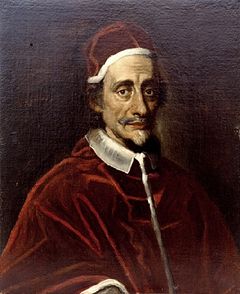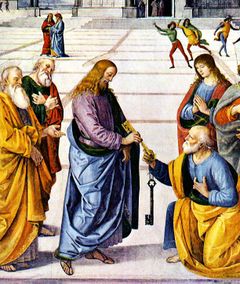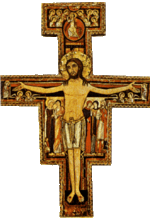Pope Innocent XI
| Innocent XI | |
|---|---|
 |
|
| Papacy began | 21 September 1676 |
| Papacy ended | 12 August 1689 |
| Predecessor | Clement X |
| Successor | Alexander VIII |
| Personal details | |
| Birth name | Benedetto Odescalchi |
| Born | May 16, 1611 Como, Duchy of Milan |
| Died | August 12, 1689 (aged 78) Rome, Papal State |
| Other Popes named Innocent | |
Blessed Pope Innocent XI (16 May 1611 – 12 August 1689), born Benedetto Odescalchi, was Pope of the Roman Catholic Church from 1676 to 1689.
Contents |
Early life

Benedetto Odescalchi was born at Como in 1611 (either on 16 or 19 May). The son of a Como nobleman, Livio Odescalchi, and Paola Castelli Giovanelli from Gandino. In 1626 his father died, and Benedetto began schooling in human sciences taught by the Jesuits at his local college, before transferring to Genoa. In 1630 he narrowly survived an outbreak of plague, which killed his mother.
The Odescalchi family, although only of minor nobility, were nevertheless determined entrepreneurs. In 1619, Benedetto's brother had founded a bank with his three uncles in Genoa which quickly grew into a successful money-lending business. After completing his studies in grammar and letters, the 15-year old Benedetto moved to Genoa to take part in the family business as an apprenctice. Lucrative economic transactions were established with clients in the major Italian and European cities, such as Nuremberg, Milan, Cracow, and Rome.
Some time between 1632 and 1636, Benedetto decided to move to Rome and then Naples in order to study civil law. This led to securing the offices of protonotary apostolic, president of the apostolic chamber, commissary of the Marco di Roma, and governor of Macerata; on 6 March 1645, Pope Innocent X (1644–55) made him Cardinal-Deacon with the deaconry of Santi Cosma e Damiano. He afterwards became legate to Ferrara. When he was sent to Ferrara in order to assist the people stricken with a severe famine, the Pope introduced him to the people of Ferrara as the "father of the poor."
In 1650, Odescalchi became bishop of Novara, in which capacity he spent all the revenues of his see to relieve the poor and sick in his diocese. With the permission of the pope he resigned as bishop of Novara in favour of his brother Giulio in 1656 and went to Rome. While there he took a prominent part in the consultations of the various congregations of which he was a member.[1]
Papacy
Election
Odescalchi was a strong papal candidate after the death of Pope Clement IX (1667–69) in 1669, but the French government rejected him (using the now-abolished veto). After Pope Clement X (1670–76) died, Louis XIV of France (1643–1715) again intended to use his royal influence against Odescalchi's election. Instead, believing the cardinals as well as the Roman people were of one mind in their desire to have Odescalchi as their Pope, Louis reluctantly instructed the French party cardinals to acquiesce in his candidacy. On 21 September 1676, Odescalchi was chosen Clement X's successor and took the name of Innocent XI.
| Papal styles of Pope Innocent XI |
|
|---|---|
 |
|
| Reference style | His Holiness |
| Spoken style | Your Holiness |
| Religious style | Holy Father |
| Posthumous style | Blessed |
Reforming the Vatican administration
Immediately upon his accession, Innocent XI turned all his efforts towards reducing the expenses of the Curia. He passed strict ordinances against nepotism among the cardinals. He lived very parsimoniously and exhorted the cardinals to do the same. In this manner he not only squared the annual deficit which at his accession had reached the sum of 170,000 scudi, but within a few years the papal income was even in excess of the expenditures. He lost no time in declaring and practically manifesting his zeal as a reformer of manners and a corrector of administrative abuses. Beginning with the clergy, he sought to raise the laity also to a higher moral standard of living. He closed all of the theaters in Rome (considered to be centers of vice and immorality) and famously brought a temporary halt to the flourishing traditions of Roman opera. In 1679 he publicly condemned sixty-five propositions, taken chiefly from the writings of Escobar, Suarez and other casuists (mostly Jesuit casuists, who had been heavily attacked by Pascal in his Provincial Letters) as propositiones laxorum moralistarum and forbade anyone to teach them under penalty of excommunication.[1] He condemned in particular the most radical form of mental reservation (stricte mentalis) which authorised deception without an outright lie.
Personally not unfriendly to Miguel de Molinos, Innocent XI nevertheless yielded to the enormous pressure brought to bear upon him to confirm in 1687 the judgement of the inquisitors by which sixty-eight quietist propositions of Molinos were condemned as blasphemous and heretical.
Jewish relations
Innocent showed a degree of sensitivity in his dealings with the Jews within the Italian States. He compelled the city of Venice to release the Jewish prisoners taken by Francesco Morisini in 1685. He also discouraged compulsory baptisms which accordingly became less frequent under his pontificate; but he could not abolish the old practice altogether.
More controversially on 30 October 1682 he issued an edict by which all the money-lending activities carried out by the Roman Jews were to cease. Such a move would incidentally have financially benefitted his own brothers who played a dominant role in European money-lending. However ultimately convinced that such a measure would cause much misery in destroying livelihoods, the enforcement of the edict was twice delayed[2].
Foreign relations
The Battle of Vienna
Innocent was an enthusiastic initiator of the Holy League which brought together the German Estates and King John III of Poland who in 1683 hastened to the relief of Vienna which was being besieged by the Turks. After the siege was raised, Innocent again spared no efforts to induce the Christian princes to lend a helping hand for the expulsion of the Turks from Hungary. He contributed millions of scudi to the Turkish war fund in Austria and Hungary and had the satisfaction of surviving the capture of Belgrade, September 6, 1688.[3]
Relations with France
The pontificate of Innocent was marked by the struggle between the absolutism and hegemonic intentions of Louis XIV, and the primacy of the Catholic Church. As early as 1673, Louis had by his own power extended the right of the régale over the provinces of Languedoc, Guyenne, Provence, and Dauphiné, where it had previously not been exercised.
All the efforts of Innocent to induce Louis XIV to respect the rights and primacy of the Church proved useless. In 1682, the King convoked an assembly of the French clergy which adopted the four articles that became known as the Gallican Liberties. Innocent XI annulled the four articles on 11 April 1682, and refused his approbation to all future episcopal candidates who had taken part in the assembly.[1]
To appease the Pope, Louis began to act as a zealot of Catholicism. In 1685 he revoked the Edict of Nantes and inaugurated a persecution of French Hugenots. Innocent expressed displeasure at these drastic measures and continued to withhold his approbation from the episcopal candidates.

Innocent irritated the King still more that same year by abolishing the much abused right of asylum, by which foreign ambassadors in Rome had been able to harbor in embassies any criminal wanted by the papal court of justice. He notified the new French ambassador, Marquis de Lavardin, that he would not be recognized as ambassador in Rome unless he renounced this right, but Louis XIV would not give it up. At the head of an armed force of about 800 men Lavardin entered Rome in November 1687, and took forcible possession of his palace. Innocent XI treated him as excommunicated and placed under interdict the Church of St. Louis at Rome where he attended services on 24 December 1687.[3]
In January 1688, Innocent also received the diplomatic mission which had been dispatched to France and the Vatican by Narai, the King of Siam under Fr. Guy Tachard and Ok-khun Chamnan in order to establish relations.
Cologne controversy

The tension between the Pope and the King of France increased by Innocent's procedure in filling the vacant archiepiscopal see of Cologne. The two candidates for the see were Cardinal William Egon of Fürstenberg, then Bishop of Strasbourg, and Joseph Clement, a brother of Max Emanuel, Elector of Bavaria. The former was a willing tool in the hands of Louis XIV, and his appointment as Archbishop and Prince-elector of Cologne would have implied French preponderance in north-western Germany.
Joseph Clement was not only the candidate of Emperor Leopold I of Austria (1658–1705) but of all European rulers, with the exception of the King of France and his supporter, King James II of England (1685–88). At the election, which took place on 19 July 1688, neither of the candidates received the required number of votes. The decision, therefore, fell to Innocent, who designated Joseph Clement as Archbishop and Elector of Cologne.
Louis XIV retaliated by taking possession of the papal territory of Avignon, imprisoning the papal nuncio and appealing to a general council. Nor did he conceal his intention to separate the French Church entirely from Rome. The Pope remained firm. The subsequent fall of James II in England destroyed French preponderance in Europe and soon after Innocent XI's death the struggle between Louis XIV and the papacy was settled in favour of the Church.[1]
Innocent and William of Orange
Innocent XI dispatched Ferdinando d'Adda as nuncio to the Kingdom of England, the first representative of the Church to go to that land in more than one hundred years. Even so, the Pope did not approve the imprudent manner in which James II attempted to restore Catholicism in England. He also repeatedly expressed his displeasure at the support which James II gave to the autocratic King Louis XIV in his measures hostile to the Church. It is, therefore, not surprising that Innocent XI had little sympathy for the Catholic King of England, and that he did not assist him in his hour of trial.[3]
In 2007, researchers Rita Monaldi and Francesco Sorti, drew popular attention to the claim, repeatedly made by historians over the intervening centuries, that Innocent XI had secretly funded the resistance of the Protestant hero William of Orange to the French King, and even financed his overthrow of James II of England. This was done using the established Odescalchi family business in money-lending.[4]
Death and beatification

Innocent XI died after a long period of ill health on 12 August 1689.
His body today lies with the bodies of Pope St Pius X (1903–14) and Blessed Pope John XXIII (1958–63) at the Vatican. The face and hands are lined with silver coating. His monument (1697–1704) in Saint Peter's was designed and sculpted by Pierre-Étienne Monnot.
The process of Innocent's beatification was introduced in 1714 by Benedict XIV and continued by Clement XI and Clement XII; but French influence and the accusation of Jansenism caused it to be suspended in 1744. In the 20th century it was reintroduced, and Pope Pius XII (1939–58) announced his beatification on 7 October 1956. The feast day of Pope Blessed Innocent XI is 12 August, the date of his death.
Reports suggest that following the attacks on the United States of America on 9/11, the Church decided to advance the long-suspended cause of Innocent to be canonised: as the pope who had prevented the Turks from overrunning Christendom in 1683, thus drawing parallels with aggressive Islamism. However, popular revelations made in the novel, Imprimatur damaged Innocent's reputation and thus the planned canonisation of Benedetto Odescalchi was suspended indefinitely[5].
Encyclicals
- Sollicitudo pastoralis (Fostering and Preserving the Orders of Men Religious)
- Coelestis Pastor (Condemning the errors of Molinos)
Notes
- ↑ 1.0 1.1 1.2 1.3 Kelly, 287
- ↑ Isidore Singer, The Jewish Encyclopaedia, Varda Books, 2003
- ↑ 3.0 3.1 3.2 Kelly, 288
- ↑ Moore, Malcolm (20 March 2008). "Vatican forced us out of Italy, claim authors". The Daily Telegraph (London). http://www.telegraph.co.uk/news/worldnews/1582334/Vatican-forced-us-out-of-Italy-claim-authors.html. Retrieved 22 May 2010.
- ↑ The Independent, 13 May 2008 at http://www.independent.co.uk/news/world/europe/a-papal-mystery-827008.html
External links
- The Body of Innocent XI in St Peter's Basilica
References
- Kelly, J.N.D., The Oxford History of the Popes, Oxford University Press, 1986. ISBN 0192820850.
![]() This article incorporates text from a publication now in the public domain: Herbermann, Charles, ed (1913). "Pope Innocent XI". Catholic Encyclopedia. Robert Appleton Company.
This article incorporates text from a publication now in the public domain: Herbermann, Charles, ed (1913). "Pope Innocent XI". Catholic Encyclopedia. Robert Appleton Company.
| Catholic Church titles | ||
|---|---|---|
| Preceded by Clement X |
Pope 1676–89 |
Succeeded by Alexander VIII |
|
|||||||||||||||||||||||||||||||||||||||||||||
|
|||||||||||||||||||||||||||||||||||||||||

